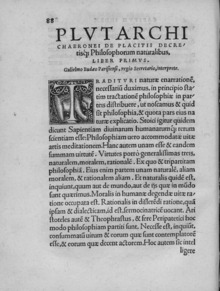De Iside et Osiride

1531 edition in Latin
|
|
| Author | Plutarch |
|---|---|
| Country | Roman Greece |
| Language | English |
| Genre | Essays |
|
Publication date
|
c. 100 AD |
The Moralia (Ancient Greek: Ἠθικά Ethika; loosely translated as "Morals" or "Matters relating to customs and mores") of the 1st-century Greek scholar Plutarch of Chaeronea is an eclectic collection of 78 essays and transcribed speeches. They provide insights into Roman and Greek life, but often are also timeless observations in their own right. Many generations of Europeans have read or imitated them, including Michel de Montaigne and the Renaissance Humanists and Enlightenment philosophers.
The Moralia include On the Fortune or the Virtue of Alexander the Great—an important adjunct to his Life of the great general—On the Worship of Isis and Osiris (a crucial source of information on Egyptian religious rites), and On the Malice of Herodotus (which may, like the orations on Alexander's accomplishments, have been a rhetorical exercise), in which Plutarch criticizes what he sees as systematic bias in the Histories of Herodotus;." along with more philosophical treatises, such as On the Decline of the Oracles, On the Delays of the Divine Vengeance, On Peace of Mind and lighter fare, such as Odysseus and Gryllus, a humorous dialog between Homer's Odysseus and one of Circe's enchanted pigs. The Moralia were composed first, while writing the Lives occupied much of the last two decades of Plutarch's own life.
Some editions of the Moralia include several works now known to be pseudepigrapha: among these are the Lives of the Ten Orators (biographies of the Attic orators based on Caecilius of Calacte), On the Opinions of the Philosophers, On Fate, and On Music. One "Pseudo-Plutarch" is held responsible for all of these works, though their authorship is unknown. Though the thoughts and opinions recorded are not Plutarch's and come from a slightly later era, they are all classical in origin and have value to the historian.
...
Wikipedia
